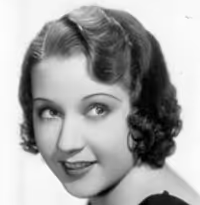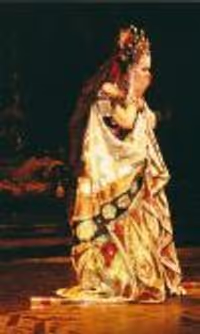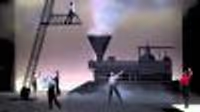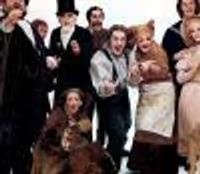Oklahoma! and revisionist history
FranklinDickson2018
Stand-by Joined: 4/6/18
#1Oklahoma! and revisionist history
Posted: 10/20/19 at 2:55pm
No..... just.......no. Punk rock? And did "Oklahoma!" really drop??? I know the expression but have never heard it referred to the opening of a Broadway show. #alteredrealitySunday
Quote from BWW.
"The reality is, that in 1943, when [Oklahoma!] dropped, it was punk rock as hell," says leading man Damon Daunno. "It was progressive! I personally think that Rodgers and Hammerstein wrote what we are doing. So I'd like to think that it's 100% your grandparents' Oklahoma!"
#2Oklahoma! and revisionist history
Posted: 10/20/19 at 3:08pm
It's very silly, but I get why he's saying it.
imissthemusic2
Swing Joined: 9/21/19
#3Oklahoma! and revisionist history
Posted: 10/20/19 at 3:10pm
His point makes total sense to me, though I do agree it's a bit of a funny way of saying it.
#4Oklahoma! and revisionist history
Posted: 10/20/19 at 3:15pm
What he's saying is that when Oklahoma! premiered it was considered edgy and revolutionary and was intended to be so. Awkward phrasing but I get what he;s trying to say.
FranklinDickson2018
Stand-by Joined: 4/6/18
#5Oklahoma! and revisionist history
Posted: 10/20/19 at 3:21pm
My issue is that he said they are doing what R & H wrote. That is the stretch to me. Just like the R&H pop songs (eg "Beautiful Morning to a different tune). Of course perform how and what what you like but don't call it what it isn't.
#6Oklahoma! and revisionist history
Posted: 10/20/19 at 3:22pm
I also get what he’s saying. 500 people have opposed Damon’s thinking, but 5,000 audience members have agreed with this punk rock analysis.
(And no, I didn’t survey 5,500 people.)
#7Oklahoma! and revisionist history
Posted: 10/20/19 at 3:26pm
FranklinDickson2018 said: "My issue is that he said they are doing what R & H wrote. That is the stretch to me. Just like the R&H pop songs (eg "Beautiful Morning to a different tune). Of course perform how and whatwhat you like but don't call it what it isn't."
What was your opinion after seeing this production?
#8Oklahoma! and revisionist history
Posted: 10/20/19 at 3:38pm
FranklinDickson2018 said: "My issue is that he said they are doing what R & H wrote."
They are "doing what R & H wrote," though, are they not? They haven't changed any of the lyrics or the score, and he didn't say they're using Robert Russell Bennett's original orchestrations, which they're not. His comment reflects that they're employing the original material (unchanged) in a production that captures the revolutionary sensibility of the original production in a way that feels equally revolutionary today. Nothing "revisionist" about that.
#9Oklahoma! and revisionist history
Posted: 10/20/19 at 3:50pm
I mean the philosophies of R&H and punk are almost a complete antithesis. R&H were building on a tradition, not tearing one down, were optimistic, not nihilistic, were obsessed with graft, not raw energy and drive replacing craft, and were bent on creating, not celebrating a post-modern recycling of signs because the future was over.
BUT that's not what Damon meant. He meant they were daring, broke the rules, and presented things you "weren't allowed" to present--from opening with a quiet ballad and no chorus to killing a major character onstage. Yes, the analogy is silly, but it's well-meant, and I think it will be taken and has been taken for what he meant as a connection between the two rather than the myriad ways in which they have no connection whatsoever. I'm sure it's important to him to bridge a culture he loves today with one from long before his birth he fells drawn to now. And it may help some young people give R&H a chance. What's wrong with that?
People have said Mozart was a punk. And I'm sure they've said it about Shakespeare, too. It means "they were revolutionary and they weren't fuddy-duddies in their time, no matter who encased in old-fashioned culture they seem today."
#10Oklahoma! and revisionist history
Posted: 10/20/19 at 6:41pm
As mentioned in Steven Suskin's "The Sound of Broadway Music", when Richard Rodgers as producer was reviving some of his (and others'![]() older shows he was not opposed to having the orchestrations re-done to bring them in line with contemporary tastes - make of that as you will.
older shows he was not opposed to having the orchestrations re-done to bring them in line with contemporary tastes - make of that as you will.
#11Oklahoma! and revisionist history
Posted: 10/20/19 at 7:42pm
There was a second age of Mozart, albeit a short one, with the appearance of the film Amadeus in 1982. It was hard to get through the day without hearing the strains of eine kleine nachtmusik. There were a number of advertising campaigns that used it.
Odd, but it's certainly not widely played today. And Mozart himself could use a new public relations firm. I believe that Beethoven has surged far past him again.
#12Oklahoma! and revisionist history
Posted: 10/20/19 at 9:36pm
That is the fatuous comment of an actor and, no, I'm not going to take my musical theater 101 history lesson from a young actor in thrall with his own first blush of fame. R&H were cutting edge in that they were intrinsically taking the traditions of musical theater and expanding upon them where few had done so. They weren't exploding them from within and reinventing them because they both had much respect for the idiom.
To say that the current revival of Oklahoma! (which I saw and thoroughly enjoyed) is doing what R&H wrote is stupid...... of COURSE it is. It is not, however, doing it AS INTENDED, and that's a big difference. R&H were meticulous in not only what they wrote, but also writing for a specifically intended presentation. All of this scraping for relevancy with a potential younger audience is annoying. Just do what you're doing and see how it works; don't attach meaning where there is none.
#13Oklahoma! and revisionist history
Posted: 10/20/19 at 9:59pm
Let's see what we can conclude from all of this.
First, it seems to be the consensus that the production is performing what R&H wrote. (Not much of a leg to stand on to deny that.)
Second, who cares whether it is consistent with what they intended well over a half century ago? So long as the production has the blessing of R&H's delegatee, that's the end of that inquiry.
Third, who cares what a performer has to say? We pay far too much attention to what people say about the work they are doing; the ultimate (and only) test is whether what they have presented to us resonates for us. And here, objectively, it resonates in the aggregate.
This show has been much appreciated by many, including, surprisingly, a lot of folks who had pretty much eschewed R&H. Everyone else is entitled to their opinion.
Jarethan
Broadway Legend Joined: 2/10/11
#14Oklahoma! and revisionist history
Posted: 10/20/19 at 10:50pm
HogansHero said: "Let's see what we can conclude from all of this.
First, it seems to be the consensus that the production is performing what R&H wrote. (Not much of a leg to stand on to deny that.)
Second, who cares whether it is consistent with what they intended well over a half century ago? So long as the production has the blessing of R&H'sdelegatee, that's the end of that inquiry.
Third, who cares what a performer has to say? We pay far too much attention to what people say about the work they are doing; the ultimate (and only) test is whether what they have presented to us resonates for us. And here, objectively, it resonates in the aggregate.
This show has been much appreciated by many, including, surprisingly, a lot of folks who had pretty much eschewed R&H. Everyone else is entitled to their opinion."
Well said. I am one of the people who had given up on it; as I watched the show, I was surprised to realize that the words were there, but — at least in my viewing lifetime — the directors of the productions I have seen emphasized the corn and not the darkness. I have always intensely disliked the corn version. This production made me understand what R&H had in mind.
#15Oklahoma! and revisionist history
Posted: 10/20/19 at 11:08pm
It’s an imprecise term, but when “punk rock” is used as an adjective instead of a noun, it’s traditionally meant “bracing, iconoclastic, proudly idiosyncratic and political, and a reaction against the vapid, insipid or decadent mainstream.”
The musically ambitious and culture-mixing Clash were as punk as the aggressive, trolling nihilism of the Sex Pistols or the pure stripped-back teenage adrenaline of the Ramones. (I’ve even read articles positing Sha Na Na as godfathers of punk for their irony-laced, harder and faster and louder co-opting of Fifties nostalgia as proudly dumb and disposable party music, always with tongue in cheek.)
#16Oklahoma! and revisionist history
Posted: 10/21/19 at 11:38pm
PianoMann said: "FranklinDickson2018 said: "My issue is that he said they are doing what R & H wrote."
They are "doing what R & H wrote," though, are they not? They haven't changed any of thelyrics or the score, and he didn't say they're using Robert Russell Bennett's original orchestrations, which they're not. His comment reflects that they're employing the original material (unchanged) in a production that captures the revolutionary sensibility of the original production in a way that feels equally revolutionary today. Nothing "revisionist" about that.
"
Stage directions are also part of "the original work". Courts have ruled so on this issue.
Caveat: in this context, "stage directions" do not mean the stage manager's notes that are later added to Samuel French editions. I.e., "John crosses to DSL, sits on couch and lights a cigarette."
But such directions as Hammerstein wrote in his final version of the libretto ARE indeed part of the "original". Hammerstein's agent--Ted Chapin--seems to have approved of any changes made to those directions, so there is no legal liability. But the actor's statement isn't exactly accurate, because...
Updated On: 10/21/19 at 11:38 PM
bear88
Broadway Legend Joined: 4/26/16
#17Oklahoma! and revisionist history
Posted: 10/22/19 at 12:05am
GavestonPS, you made me laugh.
I didn't think this version of Oklahoma! was perfect, but I certainly understand the point Daunno was trying to make. I'm with HogansHero and Jarethan. I love the Oklahoma! score, always have, but the darkness that's right there and then ignored always bothered me. Plus, I loved the way the score was reimagined so much that I got the cast recording, which makes it my first R&H cast recording. And my college-age daughter loves it too.
Videos











